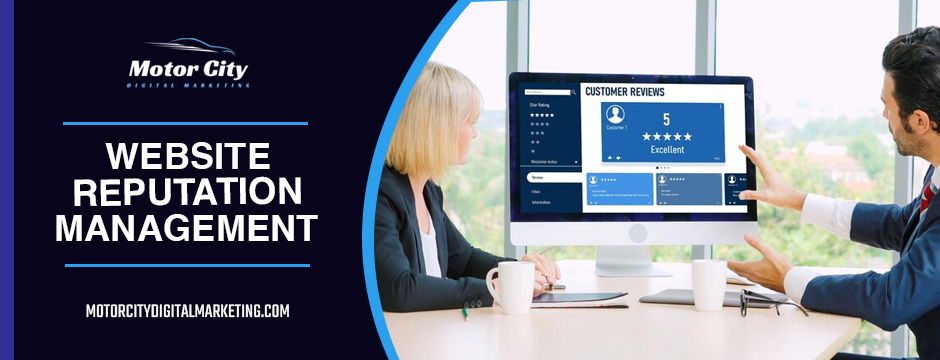The Crucial Role of Website Reputation Management in the Digital Age: 10 Key Points
In today’s hyper-connected digital landscape, where information travels at lightning speed and online interactions shape perceptions, website reputation management has emerged as a critical aspect of maintaining a positive brand image. As businesses increasingly rely on their online presence to attract and engage customers, the importance of proactively managing their reputation cannot be overstated. In this comprehensive guide, MotorCity Digital Marketing will delve into the intricacies of website reputation management and explore why it’s indispensable in the digital age.
First Impressions Matter:
Just like in the physical world, where first impressions can make or break relationships, the initial impression visitors form of your website significantly impacts their perception of your brand. Effective website reputation management ensures that your site reflects professionalism, trustworthiness, and reliability from the moment users land on it.
Building Trust and Credibility:
Trust is the cornerstone of any successful business relationship, and your website plays a pivotal role in fostering trust among your audience. By consistently delivering high-quality content, providing exceptional user experiences, and maintaining a transparent and authentic online presence, you can establish credibility and instill confidence in your brand.
Enhancing Visibility and Reach:
In a saturated digital marketplace, distinguishing oneself from competitors is crucial. Website reputation management goes hand in hand with local SEO optimization services, helping you improve your search engine rankings, increase online visibility, and expand your reach to target audiences. A positive online reputation acts as a magnet, drawing potential customers to your website and driving organic traffic.
Mitigating Negative Feedback:
Despite your best efforts, negative feedback and criticisms are inevitable in the online realm. However, how you respond to and manage these challenges can make all the difference. Effective website reputation management involves promptly addressing customer concerns, resolving issues amicably, and demonstrating a commitment to customer satisfaction. By turning negative experiences into opportunities for growth and improvement, you can safeguard your reputation and preserve customer loyalty.
Strengthening Brand Image:
Your website serves as the digital face of your brand, shaping perceptions and influencing consumer behavior. Through strategic website reputation management, you can craft a compelling brand narrative, communicate your values and unique selling propositions, and differentiate yourself from competitors. Consistency in branding across all online channels fosters brand recognition and loyalty, reinforcing your position in the minds of consumers.
Maximizing Conversion Opportunities:
A positive online reputation not only attracts visitors to your website but also encourages them to take desired actions, such as making purchases, signing up for newsletters, or requesting more information. By instilling confidence and credibility in your brand, website reputation management boosts conversion rates and maximizes the return on your digital marketing investments.
Fostering Positive User Experiences:
User experience (UX) is a key determinant of website success, influencing factors such as bounce rates, time spent on site, and engagement metrics. Website reputation management focuses on optimizing UX by ensuring seamless navigation, intuitive design, fast loading speeds, and mobile responsiveness. By prioritizing user satisfaction and convenience, you can cultivate positive experiences that keep visitors coming back for more.
Monitoring and Analysis:
Effective website reputation management involves continuous monitoring and analysis of online mentions, reviews, and social media conversations related to your brand. By leveraging monitoring tools and analytics platforms, you can gain valuable insights into consumer sentiment, identify emerging trends, and proactively address potential reputation threats. Regular performance assessments enable you to refine your strategies, capitalize on opportunities, and stay ahead of the curve.
Protecting Against Reputation Damage:
In today’s interconnected digital ecosystem, reputation damage can occur swiftly and spread rapidly, posing significant risks to your brand’s viability and profitability. Website reputation management serves as a proactive defense mechanism, allowing you to identify and mitigate potential threats before they escalate into crises. By maintaining a vigilant watch over your online presence and responding promptly to any issues or attacks, you can safeguard your brand’s reputation and minimize the impact of negative publicity.
Long-Term Sustainability and Growth:
Ultimately, website reputation management is not just about managing perceptions in the short term, but also about laying the foundation for long-term sustainability and growth. By investing in building and protecting your brand’s reputation, you create a resilient and enduring asset that fuels customer loyalty, drives business growth, and fosters a positive brand legacy for years to come.
EndNote
Website reputation management is a multifaceted discipline that encompasses various strategies and tactics aimed at shaping, maintaining, and enhancing the perception of your brand in the digital realm. From optimizing search engine visibility to mitigating negative feedback and fostering positive user experiences, effective reputation management is indispensable for businesses seeking to thrive in the competitive landscape of the digital age. By prioritizing reputation management as a strategic imperative, you can position your brand for success and resilience in an ever-evolving online ecosystem.
Wish to contact the best company providing website reputation management services? Visit us at MotorCity Digital Marketing.


